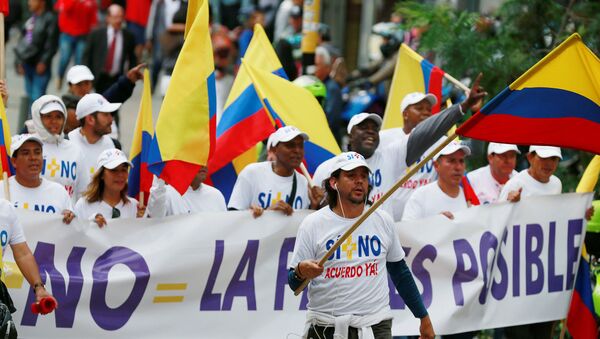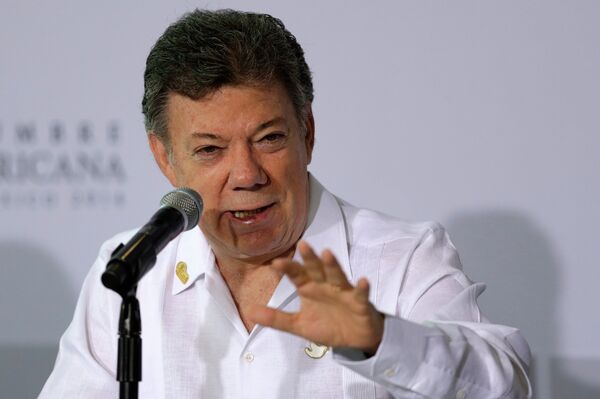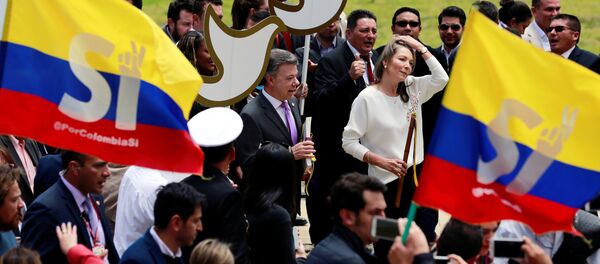"If at first you don't succeed try, try and try again."
Colombian President Juan Manuel Santos, the recent winner of the Nobel Peace Prize, appears to have taken that maxim to heart.
On Wednesday 23 November, it was announced that a Colombian Peace Deal 2.0 had been agreed between the Colombian government and the Revolutionary Armed Forces of Colombia (FARC).
It follows the collapse in October 2016, of a previous peace deal to end the five-decade long insurgency.
President Santos said the signed pact would need to go to Congress for approval.
However, controversially, the direct approval of the Colombian people themselves will not be sought.
The failure of the October accord was brought about because in a national wide referendum, a narrow majority of 50.21% of Colombians rejected the terms of the then proposed deal.
It was felt that the government had made too many concessions to the FARC forces, offering punishments such as clearing landmines, instead of more substantial sentences.
Bitter resentment in many parts of the country remains as a legacy of the five decades of civil strife. More than 260,000 have been killed, and five million people displaced.
Opponents of the new deal, led by former president Alvaro Uribe, believe that a second referendum on the revised peace accord should happen, because they claim the terms are still too lenient to the rebel fighters.
In Colombia recent referendum NO vote be damned. Santos ready to sign new deal with FARC anyway. Forget the people of Colombia. Disgraceful https://t.co/tQ3iOjiuxR
— Fernando Amandi Sr. (@FernandoAmandi) November 21, 2016
Government and rebel negotiators have made more than 50 changes to the original peace deal, but opponents argue the changes don't go far enough.
Four of the key changes are:
— FARC will have to declare all their assets and hand them over for reparation payments to the victims of the conflict.
— A ten year time limit has been set for the transitional justice system.
— FARC rebels will be compelled to provide information about all drug trafficking they may have been involved in.
— The peace agreement will be integrated into Colombia's constitution.
In a televised speech, President Santos urged Colombians to accept the deal being put to their representatives in Congress, rather than to them in a second referendum.
"The immense majority of the sectors of civil society, the youth, the church and political sectors have indicated their concern of a new plebiscite. A new campaign would polarize the country in a dangerous way, and this is a moment for union and not division. I am in agreement with them. My job as President is to promote union, not polarization," President Santos said.
A tentative ceasefire is currently in place, but the government wants the revised peace deal signed as quickly as possible to try and prevent further violence.
President Santos called the new deal, "a unique opportunity to close this painful chapter in our history." He added that the new accord "possibly won't satisfy everybody, but that's what happens in peace accords."
If FARC (Colombia) does not turn in the drug business in the peace deal, the USA will be flooded with drugs @KellyannePolls @marcorubio
— Billy Otero (@Billyotero) November 18, 2016
Mr. Santos stressed that his government felt that forging a new peace deal needed to happen as quickly as possible.
"Lives have been lost and many more lives are at risk. We couldn't forgive ourselves if we hadn't acted promptly and firmly to correct that situation. We need to act. There's no time to waste."
The newly signed peace accord will be put before Colombia's Congress.
President Santos is to be presented with the Nobel peace prize at a ceremony in Oslo, Norway, on December 10.




